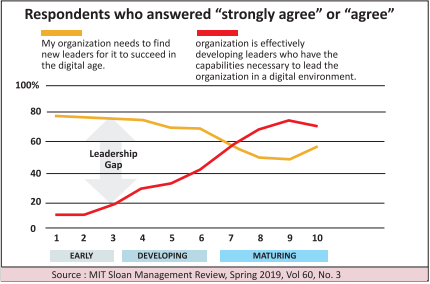In today's digital world, there has been a shift in customer expectations. Hence, leaders must now be prepared to embrace uncertainty and thrive through innovative ways which were hitherto unheard.
Digital leadership is the sine qua non to succeed in the digital world. And this is SETTING STANDARDS owing to the new reality that is emerging around us-a digitally accelerating environment that creates unimaginable opportunities, and brings about the threat of obsolescence across the nature of work, policies, systems, products, and sectors. In this new reality, it is an imperative for digital leaders to make appropriate choices that define success in the business.
An explosion of Inter Connectivity, Machine Learning, Artificial Intelligence, Blockchain, Mobile Technology, Intelligent Systems, and Innovative Apps compel today’s leaders to create newer ways of working that reflect the changing world outside and inside our organisations. In today’s digital world, there has been a shift in customer expectations, which is increasing at a very rapid rate. Hence, leaders must now be prepared to embrace uncertainty and thrive through innovative ways which were hitherto unheard of even three years ago.
Innovative digital transformation: The new norm
In this rapidly and digitally changing environment, an incremental change in response to competitive forces may not yield extraordinary results. Hence, innovative digital transformation has emerged as the new normal. Competitors are changing the rules and the structure of the entire market. For instance, Uber has disrupted the taxi market across the globe. The mere use of an App has changed the ways in which we travel in cities, and has also been popularly termed as ‘Uber moments’.
A research carried out in 2013 estimated that there will be over 30 Billion devices connected around the world in the ‘internet of things’ by 2020. Sensing and responding to data through intelligent devices range from our heart rates, the movement of goods in supply chains, to temperatures of volcanos. The future may stand witness to the fact that human interaction will be abysmally minimal to connect, adapt, and decide on future actions. Leaders need to realise that the potential for chaos is on an increase in this digital world, and the ability for human control is diminishing.
The potential of Blockchain
How leaders can create value in the new digital age has been narrated in the book, “The Real Business of Blockchain” by Christophe Uzureau and David Furlonger. Blockchain is reportedly one of the most revolutionary technologies available today, and from the perspective of an enterprise, it is still young and evolving. Leaders of forward-thinking organisations must appreciate the potential of Blockchain, which is a digital leadership nuance that can radically change the way organisations operate – truly a transformative paradigm shift. Human + Machine identifies “fusion skills” that are necessary for success in the business processes of the digital world to create better collaborative outcomes. Eight such fusion skills have been identified as below: -
- Rehumanising time
- Responsible normalising
- Judgement integration
- Intelligent interrogation
- Bot-based empowerment
- Holistic melding
- Reciprocal apprenticing
- Relentless re-imagining
Business leaders must pay attention to these fusion skills to update themselves. Contemporary literature in management has documented that the roles of employees will be redesigned around the desired outcomes of reimagined business processes. Several companies are using AI to uncover the unknowns in their businesses. It is said that the platform of Machine Learning is not only about seeing patterns and correlations in data, “it’s about actually discovering causal links.”
Online Retailing, which is driven by the Digital business model, has become the order of the day as against the traditional brick and mortar driven business model. Same-day delivery with online shopping, and virtual reality gaming experiences are some of the changes that were forced upon us. Powered by technology, the accelerated pace of change propels today’s leaders to create critical connections and build organisational agility so that companies remain relevant even when the rules of the game change.
It has been told and written on numerous occasions that leaders must seize opportunities. While seizing opportunities is often fraught with risk, not seizing them pose a greater risk, and hence, digital leadership is a great deal more promising.
The present-day thinking is that the digital age leaders need to be disruptors as well as enablers. Characteristics of digital leaders are: -
(a) Ability to shake up thinking
(b) Embrace ideas from different environments
(c) Link unrelated pieces of information
(d) See newer possibilities
(e) Challenge the status quo
In view of the above, there is a compelling case for leaders of the present-day organisations to value the importance of digital leadership, and leaders across all functions and domains must keep the following pointers in mind:
Leaders with a disruptive mindset have the traits of refusing to see things as normally as the others, challenging preconceptions, creating new possibilities, and engaging others to make it a reality. Are the leadership challenges of the digital world similar to that of traditional leadership skills is a question that needs to be examined. Researchers and practitioners have agreed that while core leadership skills remain the same, certain new skill sets are required for digital leaders.
A Research undertaken by Gerald C. Kane, Anh Nguyen Philips, Jonathan Copulsky, and Garth Andrus (2019) demonstrates that digital leadership is in high demand.
- Leaders must build future scenarios and conceive what could be the digital reality of their organisations
- Anticipating markets and trends, making well-informed decisions, solving tough problems in turbulent times are three constituents of transformative vision, which is essential for digital leadership.
- Crystal clear vision with the ability to navigate, a sound strategic willingness to be open for quick changes, and foresight are the skills needed to be honed.
- Digital literacy is the corner stone of digital leadership development paradigm, and leaders of organisations must update their digital skills in order to make well informed decisions.
- It is pertinent to recognise that digital business moves very rapidly and getting prepared to lead with new ways in digital environment.
- The ability to lead networks of people and teams should be valued as a higher order skill than leading through command and control/ hierarchical approach.
- Innovation, a culture of experimentation, and less-thansuccessful efforts should also be encouraged.
- Leaders of forward-thinking organisations must explore the possibility of exploiting Blockchain technology that can dramatically transform the way organisations operate.
- Artificial intelligence “Human + Machine” can hugely impact the desired business outcomes of organisations
Does your organisation support you in maintaining work-life boundaries?
Trending
-
SBI General Insurance Launches Digital Health Campaign
-
CredR Rolls Out 'Life Happens' Leave For Its Employees
-
Meesho Announces 30-Week Gender-Neutral Parental Leave Policy
-
Microsoft Unveils Tech Resilience Curriculum To Foster An Inclusive Future
-
60% Indian Professionals Looking For Job Change Due To COVID: Survey
-
SpringPeople And Siemens Collaborate For Digital Transformation Push
-
86% Professionals Believe Hybrid Work Is Essential For Work Life Balance: Report
-
Almost 1 In Every 3 People's Personal Life Affected Due To Work Stress
-
Meesho Rolls Out Reset And Recharge Policy For Employees
-
80% Of Talent Leaders & Academics Say Pandemic Changed Skill Needs For Youth: Report
-
Hero Electric Rolls Out 'Hero Care' Program For Employees
-
Human Capital In Collaboration With ASSOCHAM Hosts Virtual Conference
-
IKEA India, Tata STRIVE Collaborate To Create Employability And Entrepreneurship Opportunities
-
SAP India, Microsoft Launch Tech Skilling Program for Young Women
-
DXC Technology, NASSCOM Collaborate For Employability Skills Program
-
Lenskart To Hire Over 2000 Employees Across India By 2022
-
Mindtree Launches Learn-and-Earn Program
-
Tata AIA Extends 'Raksha Ka Teeka' To Its Employees
-
Swadesh Behera Is The New CPO Of Titan
-
NetConnect Global Plans To Recruit 5000 Tech Professionals In India
-
Hubhopper Plans To Hire 60% Of Indian Podcasters By 2022
-
Corporate India Needs More Women In Leadership Roles: Report
-
Aon to Invest $30 Million and Create 10,000 Apprenticeships by 2030
-
Tech Mahindra Launches ‘Gift a Career’ Initiative for Upskilling of Youth
-
40% Women Prefer Flexible Working Options in Post-COVID World: Survey
-
3 out of 4 companies believe they can effectively hire employees virtually: Report
-
Vodafone , CGI and NASSCOM Foundation launch digital skills platform
-
Odisha: Bank, postal employees to deliver cash for elderly, differently-abled persons
-
Skill India launches AI-based digital platform for "Skilled Workforce"
-
Hiring activity declines 6.73% in first quarter: Survey
-
70% startups impacted by COVID-19 pandemic
-
Bajaj Allianz Life ropes in Santanu Banerjee as CHRO
-
Over 70 Percent MSMEs look at cutting jobs to sustain businesses
-
93 Per Cent employees stressed about returning to office post-lockdown
-
Johnson & Johnson India announces family benefits for same gender partners
-
Indian firms turning friendly towards working mothers
-
Welspun India names Rajendra Mehta as new CHRO
-
Wipro partners with NASSCOM to launch Future Skills platform



Human Capital is niche media organisation for HR and Corporate. Our aim is to create an outstanding user experience for all our clients, readers, employers and employees through inspiring, industry-leading content pieces in the form of case studies, analysis, expert reports, authored articles and blogs. We cover topics such as talent acquisition, learning and development, diversity and inclusion, leadership, compensation, recruitment and many more.
Subscribe Now











































Comment